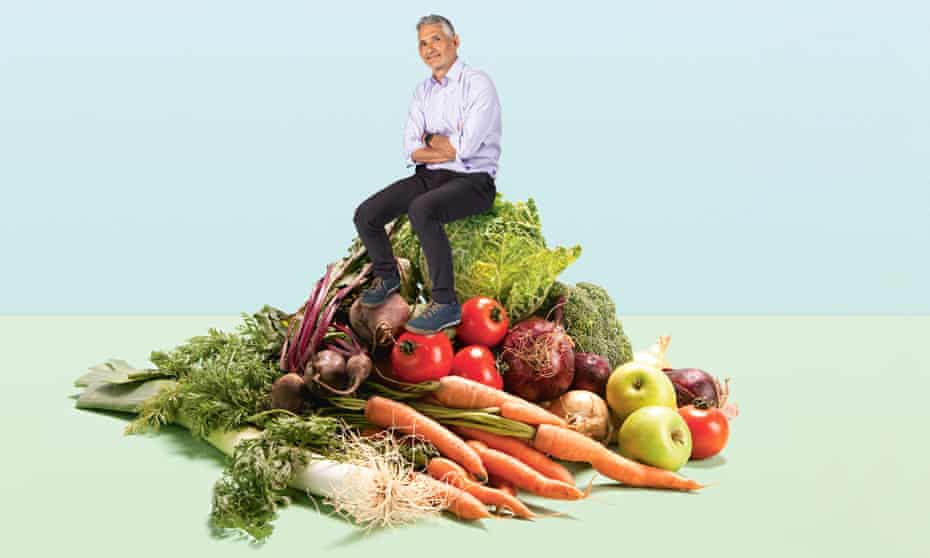
The scientist has spent years studying how gut health relates not just to nutrition, but to all aspects of our everyday wellbeing. He explains why it really is what’s inside that counts
Tim Spector’s kitchen fridge is swarming with life: kefir grains, sourdough mother, homemade kimchi and kombucha. Then there’s the vegetables: as varied and colourful as possible.
While many diets eschew certain food groups, Spector’s focuses on incorporating as much variety as possible: at least 30 different plants a week – including nuts, seeds, pulses, whole grains, fruits and vegetables – on top of starchy staples such as potatoes or rice. The reason? He believes that diversity is crucial to warding off infections, combating age-related diseases and maintaining a healthy weight.
Diversity cultivates a healthy microbiome – the micro-organisms living in our gut – which plays a vital role in digesting food, regulating our immune systems, and tweaking our brain chemistries through the chemicals they produce. “It’s that diversity of gut microbes that gives you a diversity of chemicals and, we believe, a healthier immune system and a better metabolism,” Spector says. “Once people start seeing that there is this link between the food we eat, our microbes and our immune systems, I think that changes the way we think about food. It’s not just fuel. It really is changing the way our body works.”
Spector’s diet today is a far cry from what he used to eat: typically, muesli, orange juice and tea for breakfast – sometimes with toast and marmalade – and a tuna mayonnaise sandwich, packet of crisps and carton of orange juice for lunch. “My breakfast now is a mixture of kefir and full-fat yoghurt with some berries and mixed nuts and seeds on top, plus one or two big cups of black coffee. For lunch, I might have a curry, or some other heavily plant-based meal. I am virtually vegetarian, and eat far fewer starchy foods than I used to.”
The event that prompted this change was suffering a mini stroke at the top of a mountain in his early 50s, after an energetic day of skiing in the Alps. “I went from being a sporty, fitter than average middle-aged man, to a pill-popping, depressed stroke victim with high blood pressure,” he recalls. It was a wake-up call that prompted him to reassess everything he thought he knew about healthy eating, including much of what he’d learned at medical school.
A professor of genetic epidemiology at King’s College London, Spector has spent much of his career researching how our life choices and events fuse with our genes. In 1993, he founded the UK Twins Registry at St Thomas’ Hospital in London, one of the richest collections of data about identical and non-identical twins in the world.
For years, Spector believed that genetics would explain much of why people are the way they are. And to some extent it does. For instance, Spector’s group was among the first to demonstrate that people’s weight distribution is largely influenced by their genes.
The trouble is, although identical twins have many similarities, they can often be quite different – despite sharing the same genes. “Trying to understand why one twin is sometimes overweight and the other skinny; one gets diabetes or cancer and the other doesn’t, has been a major theme for the past 20 years,” Spector says.
The discovery, in 2014, that the composition of the microbes in people’s guts could influence their body weight, provided Spector’s first “Aha!” moment. But the blinkers really fell off when he and his colleagues measured twins’ and non-twins’ responses to identical meals, and discovered that they could vary hugely between individuals, influenced by both the microbiome and genetics.
“Up to that point, we didn’t really have enough belief that you could personalise nutrition, or that you could link the uniqueness of the microbiome to the uniqueness in the food response – but suddenly, you had those two elements together,” says Spector. “We’re all very different in how we respond to the same meal, and a lot of this is explained by the huge differences in our microbiomes.”
This doesn’t mean that other factors are irrelevant to people’s health: “How much you sleep at night, the quality of your food, the exercise you get, all these things are also important,” says Spector. “All we’re saying is that the microbiome is a major modifiable factor.”
Spector likens the bacteria, fungi, and viruses in our guts to a kind of inner chemical plant: “Our own bodies only produce 20-odd gut hormones or chemicals, but these microbes produce thousands, which not only break down food into small amounts and use the contents, but produce lots of signalling compounds that are sending constant messages to our immune systems,” he says. They also produce brain chemicals, such as serotonin, as well as additional molecules that control how our bodies change food into energy.
READ RELATED: ‘My life was ruled by panic attacks’
“We don’t know exactly how, but the state of your gut microbes will influence your blood sugar peaks, as well as how you digest fats and how quickly those fats are cleared by the body. Indirectly, both of those will lead to inflammation.”
This is important, Spector explains, because chronic inflammation may increase the risk of various diseases, including type 2 diabetes, heart disease and certain cancers. It may also steer people towards laying down more body fat, which in turn then produces more inflammation.
Our microbiome can also shape our responses to infection. Spector is probably best known for his work on the ZOE Covid symptom study, which has seen millions of users logging their daily symptoms via an app to help gain a better understanding of how Sars-CoV-2 spreads, and the nature of the illness it causes.

One insight from the study is that people who consumed a greater diversity of plant-based foods pre-pandemic appear to be less susceptible to catching Covid-19, or becoming severely ill from it. While this doesn’t prove definitively that eating a diverse plant-based diet can ward off infections, Spector believes it could help: “Your immune system is compromised if you don’t have a good microbiome controlling it, and so it may either under- or overreact [to pathogens],” he says. “I don’t think eating for our microbiomes would stop pandemics, but I think it could make everyone less ill if they got infected.”
So, how do we eat for our microbiomes? In Spector’s view, this comes back to consuming a diverse and predominantly plant-based diet, which is free from highly processed foods. “These are foods that you recognise, and could make yourself from your kitchen ingredients,” says Spector. “It’s plants that are rich in defence chemicals called polyphenols – generally ones with strong tastes and colours, slight bitterness, thick skins – basically the opposite of an iceberg lettuce. It’s those grapes we used to have as kids that were a bit sour and bitter. It’s the purple carrot rather than the white carrot”
To up the polyphenol content even further, Spector recommends lashings of green tea, extra virgin olive oil, brightly coloured fruit and vegetables, herbs and spices – plus a dusting of dark chocolate. And don’t forget the four Ks: kefir, kombucha, kimchi and kraut (sauer) – as well as cheese and yoghurt – which act as fertiliser for ourresident gut bacteria.
What this amounts to is very similar to a Mediterranean diet – one high in fruits, vegetables, and whole grains, and containing less meat and dairy products than a typical western diet. Spector says: “It doesn’t really matter if you have bits of meat and fish on top of that – I don’t believe they’re necessarily healthy, but as long as you’re getting enough plants on your plate, it’s fine.”
In his latest book, Spoon Fed, Spector also discusses how microbes can affect people’s mental health. Among scientists, there’s a growing consensus that depression may be linked to elevated levels of inflammation in at least a subset of patients; Spector argues that having the right gut microbes can counter this, because they secrete a range of chemicals that both keep inflammation in check, as well as altering our mood more directly. For instance, certain microbes help to produce serotonin – the same chemical that’s increased by some antidepressants. Studies have also suggested that people with depression have a less diverse set of microbes, on average, compared with healthy individuals. “A diverse Mediterranean-style diet with a range of fermented foods to keep your microbes happy is looking like the best present you can offer your brain,” Spector writes.
Spector describes the changes he’s made to his diet as “an evolving process”. He only eats meat about once a month, while concerns about sustainability means he only has fish occasionally, at restaurants: “I wouldn’t say I suddenly had the answer when I discovered the microbiome, but I’ve slowly been changing the habits I had when I was a smug doctor thinking that I knew everything.”As well as a desire to nurture his “inner garden”, his dietary choices are motivated by the insights he’s gained from monitoring his personal responses to different foods. This is why he eschews large amounts of pasta, rice and potatoes – not because they are inherently unhealthy, but because using a continuous glucose monitor has revealed that they produce worryingly high spikes in his blood sugar levels.
He is highly dismissive of one-size-fits-all diets, and the notion that weight loss is all about calories in v calories out: “It is complete nonsense,” he says. “You and I can eat two identical muffins with the same calories in them, and you might have a mild sugar spike and no sugar dip, whereas I will have a big sugar spike and a sugar dip, and I will overeat by 200 calories in that day, and you won’t. That simple experiment, which we’ve now done on thousands of people, just blows out of the water the idea that it’s all about calories.”
In April, ZOE, the personalised nutrition company that Spector co-founded, began inviting about 180,000 individuals on its waiting list to buy an early access version of its “ZOE programme”, an attempt to bring personalised nutrition to the UK masses. It’s still a luxury lifestyle option at the moment – the £260 price tag puts it out of reach of the mass market – but early access members will start with an at-home test, the results of which provides them with personalised scores for thousands of foods in the ZOE app. Members also access daily lessons, recipes, live chat with ZOE coaches, and more. The programme consists of two parts: testing and ongoing membership. A testing kit consisting of three packets of standardised muffins (to test your biological responses and challenge your metabolism with high doses of fat and sugar), a continuous glucose monitor, plus stool and blood sampling kits; the idea is to test how people respond to various foods over a two-week period, and provide them with personalised scores for thousands of foods, and nutrition coaching, based on these results.
Spector’s ultimate goal is to change the way people think about food. “You’re eating hundreds of chemicals when you eat a carrot, it’s not just the orange colour – there’s all this other stuff that’s hidden,” he says. “All those things are lost when you stick food into a factory, ultra-process it, and put it into a vacuum pack.”
Source: Health & wellbeing | The Guardian





